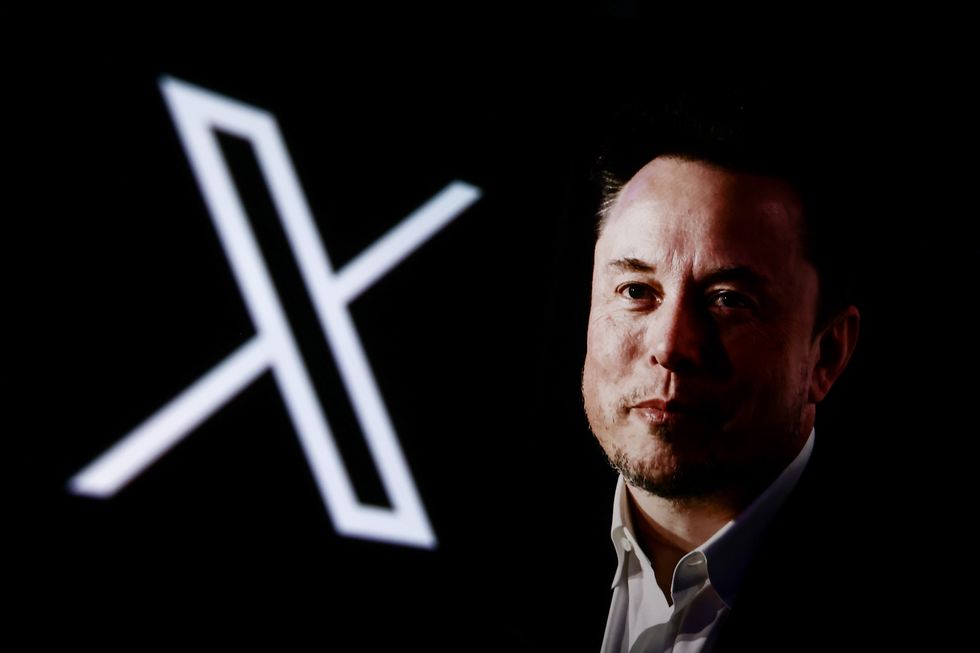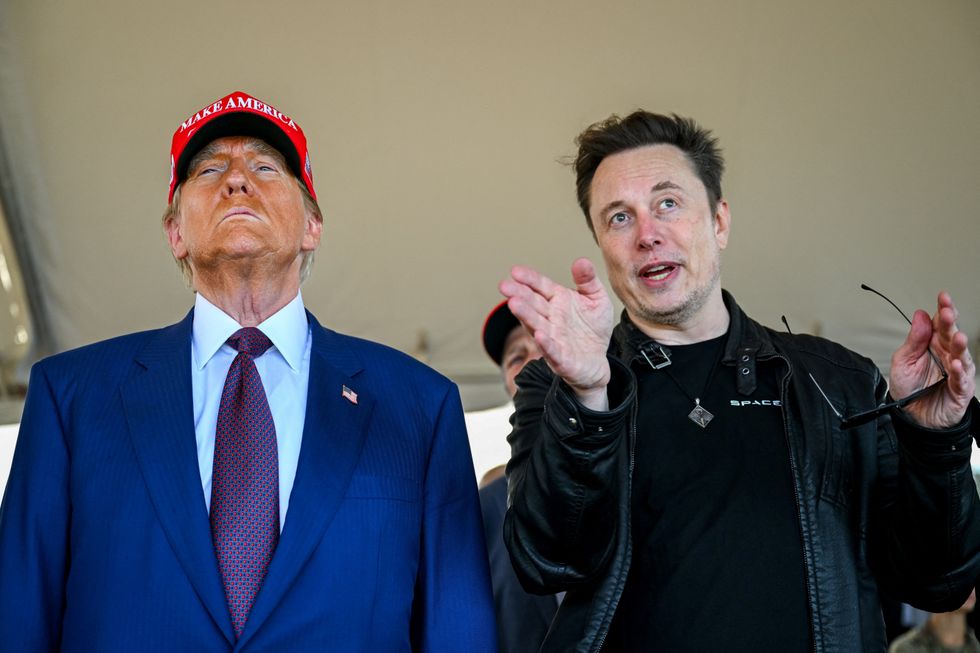Adam Chapman
Guest Reporter
Elon Musk has escalated his ongoing rift with Sir Keir Starmer, accusing the Prime Minister of failing to prosecute the grooming gangs during his tenure as head of the Crown Prosecution Service (CPS).
In a series of incendiary posts on his platform, X, he criticised the Labour government's refusal to launch a public inquiry into grooming gangs in Oldham, specifically targeting Labour MP Jess Phillips, tweeting that "she deserves to be in prison" over her role in rejecting calls for such an inquiry.
Musk also expressed support for Tommy Robinson, a controversial figure known for his stance against grooming gangs.
The eccentric billionaire advocated for Robinson's release from prison, asking his 210 million followers: "Why is Tommy Robinson in a solitary confinement prison for telling the truth?"

Musk first locked horns with our Prime Minister during the summer riots when he suggested that "civil war is inevitable" as a result of what he perceived as mishandling by Starmer's government.
He was referring to the Prime Minister's clamp down on the violent unrest that broke out following the misinformation circulating about the ethnicity of the Southport murder suspect.
Four hundred arrests were made in connection with the riots in the weeks that followed, with more than 140 people charged by early August 2024.
Some of the people who were handed sentences, which ranged from 20 months to three years, had no prior convictions and had not been directly involved in the riots but had made incendiary comments on social media.
The most high-profile case was that of Julie Sweeney, a 53-year-old carer from Cheshire who was sentenced to almost two years behind bars after suggesting in a Facebook post to "blow the mosque up with the adults in it".
This prompted Musk to popularise the hashtag #TwoTierKeir, the suggestion that under Starmer's leadership, there was differential treatment by law enforcement towards different groups, a claim that the PM strenuously denies.
This rumbled on over the next few months, with Musk accusing Starmer's Government of creating a "police state" and enforcing Soviet-style restrictions on free speech in Britain, particularly in relation to social media posts.
Then, in December, Musk took another shot at the PM. This time his economic policies were in the firing line.
The eccentric billionaire said that “very few companies” want to invest in the UK under Starmer's leadership.
He was responding to a call from a Scottish politician asking Tesla, his car company, to open a gigafactory in the country.
The PM hit back, rejecting his assessment of the Government’s policies and pointing to the billions of pounds that have come into the UK since he became PM.
His official spokesperson said: “I’m not going to get into commentary on individual comments, but if you look at what’s happened since the election, you’ve seen the £63 billion of additional investment from the investment summit.
“You’ve seen the government respond to some of the businesses’ key concerns in the UK, which is lack of stability, and the government’s brought back that stability, both politically and economically.”
LATEST MEMBERSHIP DEVELOPMENTS

The signs are not good.
Musk's libertarian leanings and emphasis on free speech fundamentally clash with what he perceives as Starmer's more regulatory and progressive policies.
These ideological differences make reconciliation challenging since they reflect core beliefs about governance and societal structure.
All this would be a headache for Starmer if it only existed in the online realm, but it's about to cross over into a political one.
With Musk playing a key role in the incoming Trump administration, his criticisms take on an international dimension, potentially affecting UK-US relations.
Heading up the newly-created Department of Government Efficiency, Musk will advise Donald Trump on innovation and efficiency, aiming to reduce the federal budget by at least $2trillion (£1.5trillion).
He aims to "clear the decks" of undue regulations and federal agencies, suggesting a massive overhaul in government operations.
Contrast this with the Labour Party under Starmer, which seeks to strengthen the role of government in strategic sectors, such as infrastructure and public services. Starmer's vision involves revitalising public services through investment rather than reduction, emphasising the role of government in setting national strategies and ensuring equitable growth.
Musk's philosophy leans towards libertarianism, emphasising free markets, minimal government intervention, and a belief that less regulation leads to more innovation and economic freedom.
His comments about Starmer's government being a "police state" indicate his discomfort with what he perceives as over-regulation.
This extends to his absolutist approach to free speech.
It would appear that Starmer and his close circle are hoping that Trump will come to his senses and Musk's influence will wane once he gets down to business.
When asked about Musk's political ambitions, senior cabinet Senior Cabinet Office minister Pat McFadden said: "Let’s see how that works out. In terms of specific outreach to him, not that I am aware of."
Find Out More...
In a series of incendiary posts on his platform, X, he criticised the Labour government's refusal to launch a public inquiry into grooming gangs in Oldham, specifically targeting Labour MP Jess Phillips, tweeting that "she deserves to be in prison" over her role in rejecting calls for such an inquiry.
Musk also expressed support for Tommy Robinson, a controversial figure known for his stance against grooming gangs.
The eccentric billionaire advocated for Robinson's release from prison, asking his 210 million followers: "Why is Tommy Robinson in a solitary confinement prison for telling the truth?"

Where did it all begin?
Musk first locked horns with our Prime Minister during the summer riots when he suggested that "civil war is inevitable" as a result of what he perceived as mishandling by Starmer's government.
He was referring to the Prime Minister's clamp down on the violent unrest that broke out following the misinformation circulating about the ethnicity of the Southport murder suspect.
Four hundred arrests were made in connection with the riots in the weeks that followed, with more than 140 people charged by early August 2024.
Some of the people who were handed sentences, which ranged from 20 months to three years, had no prior convictions and had not been directly involved in the riots but had made incendiary comments on social media.
The most high-profile case was that of Julie Sweeney, a 53-year-old carer from Cheshire who was sentenced to almost two years behind bars after suggesting in a Facebook post to "blow the mosque up with the adults in it".
This prompted Musk to popularise the hashtag #TwoTierKeir, the suggestion that under Starmer's leadership, there was differential treatment by law enforcement towards different groups, a claim that the PM strenuously denies.
This rumbled on over the next few months, with Musk accusing Starmer's Government of creating a "police state" and enforcing Soviet-style restrictions on free speech in Britain, particularly in relation to social media posts.
Then, in December, Musk took another shot at the PM. This time his economic policies were in the firing line.
The eccentric billionaire said that “very few companies” want to invest in the UK under Starmer's leadership.
He was responding to a call from a Scottish politician asking Tesla, his car company, to open a gigafactory in the country.
The PM hit back, rejecting his assessment of the Government’s policies and pointing to the billions of pounds that have come into the UK since he became PM.
His official spokesperson said: “I’m not going to get into commentary on individual comments, but if you look at what’s happened since the election, you’ve seen the £63 billion of additional investment from the investment summit.
“You’ve seen the government respond to some of the businesses’ key concerns in the UK, which is lack of stability, and the government’s brought back that stability, both politically and economically.”
LATEST MEMBERSHIP DEVELOPMENTS
- Starmer handing Khan a knighthood is cleverer and more cynical than you realise - Howard Cox
- How Brexit stopped the EU from spending a staggering amount of British money TODAY
- REVEALED: Reform's future could be decided in MONTHS as party faces its biggest election test

Where is all this headed?
The signs are not good.
Musk's libertarian leanings and emphasis on free speech fundamentally clash with what he perceives as Starmer's more regulatory and progressive policies.
These ideological differences make reconciliation challenging since they reflect core beliefs about governance and societal structure.
All this would be a headache for Starmer if it only existed in the online realm, but it's about to cross over into a political one.
With Musk playing a key role in the incoming Trump administration, his criticisms take on an international dimension, potentially affecting UK-US relations.
Heading up the newly-created Department of Government Efficiency, Musk will advise Donald Trump on innovation and efficiency, aiming to reduce the federal budget by at least $2trillion (£1.5trillion).
He aims to "clear the decks" of undue regulations and federal agencies, suggesting a massive overhaul in government operations.
Contrast this with the Labour Party under Starmer, which seeks to strengthen the role of government in strategic sectors, such as infrastructure and public services. Starmer's vision involves revitalising public services through investment rather than reduction, emphasising the role of government in setting national strategies and ensuring equitable growth.
Musk's philosophy leans towards libertarianism, emphasising free markets, minimal government intervention, and a belief that less regulation leads to more innovation and economic freedom.
His comments about Starmer's government being a "police state" indicate his discomfort with what he perceives as over-regulation.
This extends to his absolutist approach to free speech.
It would appear that Starmer and his close circle are hoping that Trump will come to his senses and Musk's influence will wane once he gets down to business.
When asked about Musk's political ambitions, senior cabinet Senior Cabinet Office minister Pat McFadden said: "Let’s see how that works out. In terms of specific outreach to him, not that I am aware of."
Find Out More...
